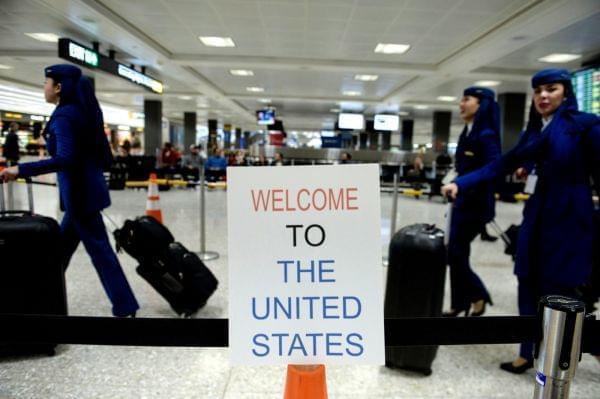Appeals Court Rejects Bid To Reinstate Trump’s Travel Ban

A sign at Washington Dulles International Airport welcomes travelers. A three-judge panel decided not to reinstate President Trump's travel ban barring travelers from seven majority-Muslim nations. Brendan Smialowski/AFP/Getty Images
A federal appeals court has unanimously rejected a Trump administration request to allow its travel ban to take effect.
The three-judge appeals panel declined to overturn a lower court's order suspending the president's ban against entry into the United States from seven majority-Muslim nations.
The travel ban was put on hold by federal district Judge James L. Robart of Seattle, who issued a nationwide restraining order on Feb. 3. Robart said that the two states challenging the ban, Washington and Minnesota, had shown that their residents and universities were harmed by Trump's action. The administration then asked the appellate panel for an emergency stay of Robart's restraining order.
President Trump tweeted his reply to the appeals court ruling, indicating he will appeal.
SEE YOU IN COURT, THE SECURITY OF OUR NATION IS AT STAKE!
— Donald J. Trump (@realDonaldTrump) February 9, 2017
The result is a rebuke to the White House. In oral arguments heard on Tuesday, the panel vigorously quizzed attorneys both for the administration and for the state of Washington, the lead plaintiff, which originally filed the suit challenging the travel ban.
The solicitor general for the state of Washington, Noah Purcell, argued that the travel ban is discriminatory and violates both federal statutes and the U.S. Constitution. He told the court that the judiciary's role is to step in and check the abuses of the executive branch.
But August Flentje, special counsel to the assistant attorney general, argued that the president has the ultimate authority to protect the national security and that his action in that regard — namely, the travel ban — was unreviewable by the courts.
However, at least two of the panelists, Judge Michelle Friedland and Judge William Canby, appeared skeptical of the administration's position and of whether Trump's travel ban amounts to a ban on Muslims.
As we reported earlier in the Two-Way, Judge Richard Clifton suggested that perhaps there was no such ban since the president's executive order affected only a small percentage (12 percent, according to an NPR analysis) of the world's Muslim population.
Democratic U.S. Senator Dick Durbin of Illinois released a statement late Thursday.
"The Court explicitly reminded our new President that his powers are subject to the limits imposed by our Constitution," he said. "This decision is critical on the merits but equally important in the sweep of history in asserting the independence of our judiciary. No President has faced this kind of reversal in the first 21 days of his Presidency. I hope President Trump will understand the constitutional significance of this ruling and rescind his illegal and divisive executive order immediately."
Links
- Immigration Ban Blocked; Central Illinois Trump Supporter; Illinois Politics; ISU President
- Lawmakers Consider Expanding Illinois Immigrant Protections
- Court Denies DOJ Request For Stay; Trump Immigration Order Remains Suspended
- Where Does Your Member Of Congress Stand On Trump’s Immigration Order?
- Trump Fires Acting Attorney General For Refusing To Defend Immigration Order
- What Trump Immigration Ban Means For Illinois
- U Of I’s Wilson Discusses Effects Of Immigration Executive Order
- The full 9th Circuit ruling
